
One of four Olympic selection events that were postponed three times this year finally happened last week: the IFSC European Championships in Moscow. A 10-day climbing marathon of individual Speed, Boulder and Lead events and the all-important Combined qualifiers and finals made for exhausting viewing for spectators online - and the few spectators who were in the crowd - let alone for the athletes competing.
Months of uncertainty as to whether the event would happen and last-minute heartbreak added to the high tension. With Austria and France publicly announcing that they would not take part, and countries such as Italy and Spain quietly standing back, the field was diminished from the outset, but disappointment for some athletes came much closer to the event. Jenya Kazbekova (UKR) - the women's Hachioji fallback option should the Moscow event have been cancelled - contracted COVID-19 with symptoms in the weeks before the event and chose not to participate. Vita Lukan (SLO) contracted the virus four weeks before the event without symptoms, but her pre-travel test remained positive, forcing her to withdraw at the very last moment. Other athletes had also recently overcome the virus, but could proceed on the basis of negative tests.
Despite the low numbers, the athletes who made it to Moscow were nonetheless strong and worthy contenders for the last European Olympic tickets and although health concerns surrounding the event were clearly valid, it appears as though the IFSC, Russia Climbing and the athletes and coaches did their utmost to ensure that the competition was as safe as possible. The livestreaming was among the best that I've watched of a climbing competition, with a good range of shots and well-chosen slow-mo replays. Some angles were a bit strange, and occasionally a moment would be missed by a poor cut, but you can't have it all and the replays made up for this. Matt Groom did a great job in his first ever IFSC event - broadcast on BBC Sport, no less - filling the very big boots that Charlie Boscoe left behind and bringing lots of enthusiasm and interaction with viewers. Many fans are sorry to see Charlie go after five years and I will miss his post-event UKC reports. Sorry, you'll all have to bear with me for the time being until next year's replacement...!
In a bizarre turn of events, two athletes who had already qualified for Tokyo withdrew due to injury in the early stages of the individual discipline events. Aleksandra Miroslaw (POL) injured a pulley during the speed final and finished 8th, while Petra Klingler (SUI) picked up a shoulder injury during Boulder qualification. Both withdrew from the Combined event, which meant that there was all to play for in Combined with all athletes being eligible in a 'winner takes all' situation. Had an Olympic-qualified athlete won, the climber in 2nd would have taken the ticket to Tokyo.
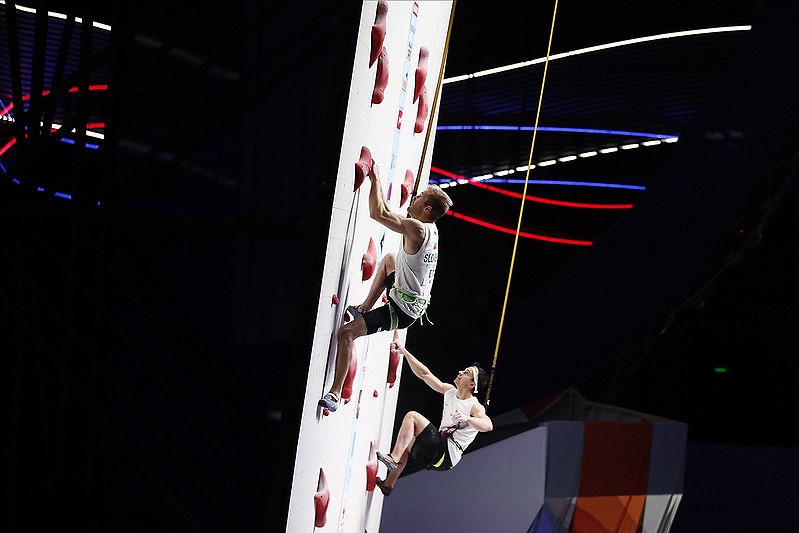
In the Speed Championship, Iuliia Kaplina (RUS) set a new women's World Record of 6.96 seconds, beating Aries Susanti Rahayu's (IDN) previous record of 6.99 seconds. In the final, however, a fall put an end to her campaign and she finished in 3rd place. Ekaterina Barashchuk (RUS) won in a close-fought race against her teammate Elizaveta Ivanova (RUS).
In the men's event, Danyil Boldyrev (UKR) finally won Gold in a European Championship event, having won three silvers and one bronze in the period of 2013-2019. Five hundredths of a second slower was Lev Rudatskiy (RUS) in 2nd place, and Marcin Dzienski took 3rd despite having recorded the fastest time of the men's event of 5.59 seconds in an earlier race.
Boulder qualifications marked the start of a tense few hours for routesetters as they watched athletes attempt their creations, having had no Boulder World Cup season to work off to gauge the general level of strength and agility after long periods of lockdown. Some gentle boulders eased the climbers in and a standout performance from 16-year-old Edvards Gruzitis (LAT) placed him 4th ahead of the semi-finals. Unfortunately he didn't make finals, but a 9th place finish in a field of older, stronger climbers makes him one to watch in the future. Jernej Kruder (SLO) topped the semi-final round and seemed in his World Cup-winning form, completing every boulder and setting the standard for a hard final, where 2 Tops and 3 Zones were enough for him to take the win. Russia's Sergei Luzhetskii and Nikolai Iarilovets finished 2nd and 3rd respectively, lining themselves up for spots in the Combined qualifier event.
With former Boulder World Champion Petra Klingler out of the runnings in semis due to her shoulder injury, the women's field was left relatively open. Regular IFSC World Cup semi-finalist Chloe Caulier (BEL) topped the leaderboard in semis, followed by Viktoriia Meshkova (RUS) and 2017 European Boulder Champion Staša Gejo (SRB). In the final, it couldn't have come much closer: just one attempt to a Zone separated Viktoriia and Chloe. Watching on the livestream, it was hard not to feel sorry for Chloe as she watched Viktoriia top the last problem on her second attempt to take the win out of her hands.
The Lead competition took place on a short (~15m) wall and once again the routesetters had the mammoth task of guessing the level of fitness after just one poorly-attended World Cup in Briançon this year. Right from the off Sascha Lehmann (SUI) and Hannes Puman (SWE) looked fresh and unfazed by the qualifying routes, while Nicolas Collin (BEL) put in a stunning fight to take the lead in semis alongside Dmitrii Fakirianov (RUS). In the final, Sascha managed to push three moves further than Nicolas to take Gold and Dmitrii placed 3rd. Will Bosi (GBR) finished 12th and out of finals.
Having proved her ability in Boulder, relatively unknown athlete Viktoriia Meshkova (RUS) showed that she was equally - or perhaps more so - dominant in Lead. She topped the qualifying route, the semi-final and ultimately, the final route. By the end of the Combined event, she had topped every Lead route in the entire competition except for two (and on one of these she dropped the last move). By winning the Lead title in addition to her Boulder title just a couple of days before, Viktoriia - at 20 years of age - became the first person in history to win two European Championship titles in Boulder and Lead in the same event (David Lama won Lead in Yekaterinburg in 2006 and then won the rescheduled 2006 Boulder Championships in Birmingham in 2007). Her work wasn't quite done yet, though. 19-year-old Eliska Adamovska (CZE) placed 2nd and stood out as another future star, with a calm and composed climbing style on the Lead wall. She topped the route 42 seconds slower than Viktoriia, and hence placed 2nd on time. GB Climbing's Molly Thompson-Smith finished in 3rd place to take her second medal at senior level. On Instagram, she wrote: 'A rollercoaster year with a pretty good finish. Psyched with this.' (UKC News Report).
A long-awaited rest day followed, for athletes and spectators alike. With the individual discipline titles done and dusted, everyone knew that there was really only one title that mattered and that the most important rounds were yet come. 'It's been a sort of unspoken thing, the Olympic ticket, until this point,' IFSC commentator Matt Groom said during the Combined competition; nobody wanted to be seen as wanting it too badly, or dwell too heavily on the end goal.
Speed qualifiers were business as usual for specialists Marcin Dzienski (POL) and Patrycja Chudziak (POL). Marcin fended off Jan Kriz (CZE) and Sergei Luzhetskii (RUS), while Patrycja was always odds-on favourite in the absence of an injured Aleksandra Miroslaw (POL) and Olympic-qualified Iuliia Kaplina (RUS), who chose not to compete in Combined. Aleksandra Kalucka (POL) ranked 2nd and Alma Bestvater (GER) put herself in a strong position by finishing 3rd.
The boulder round was unfortunately pitched a little too easy. Ten men topped all four boulders and Will Bosi (GBR) and Alex Khazanov (ISR) were ranked joint first having required the same number of attempts. The biggest shock came when Jernej Kruder - the freshly-crowned European Boulder Champion - failed to top four boulders and finished 13th with 3T4Z and out of finals. A similar story played out in the women's round, where Hannah Meul (GER), Eliska Adamovska (CZE) and Staša Gejo (SRB) each flashed all four boulders. According to IFSC rule 11.11, in both cases, athletes were "awarded ranking points […] equal to their fractional ranking", with fractional ranking equalling 1.5 points each for Will and Alex, and 2.0 each for the three women. Molly Thompson-Smith (GBR) placed 6th, putting her in a strong position to make finals ahead of the Lead round. European Champion Viktoriia Meshkova, sitting in 7th, seemed to be fatigued or nervous. Perhaps the pressure of her two wins was getting to her.
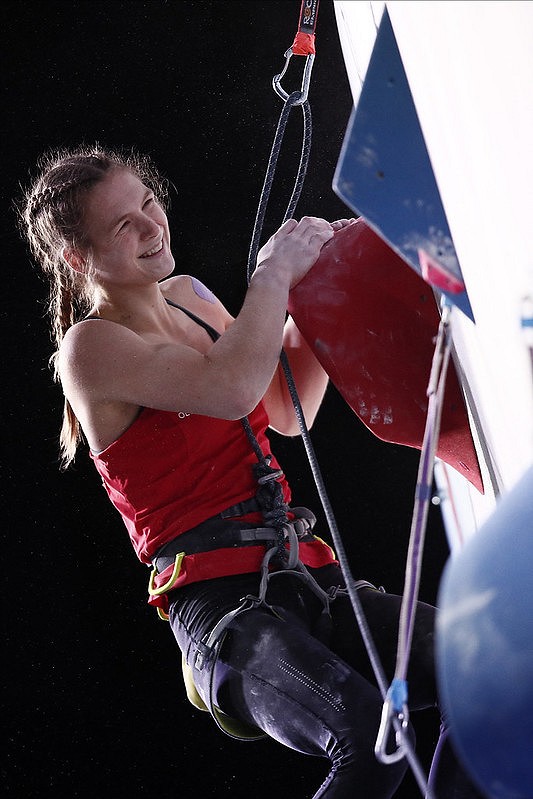
In Lead, three men topped the route: Sascha Lehmann (SUI), Yuval Shemla (ISR) and Hannes Puman (SWE). Unfortunately for Hannes, despite topping the route he just missed out on the finals in 9th place. Will Bosi ended up 12th, but - thanks to a strong performance in Boulder and Speed - ranked 3rd overall and was comfortably through to finals. The women's route received just one top by Eliska Adamovska (CZE), who pulled off an astonishing climb on a route where most of her competitors fell halfway up. Molly Thompson-Smith climbed to 2nd place and with it secured a finals spot in 6th place. At one point, European Lead Champion Viktoriia Meshkova (RUS) was seemingly scored down to hold number 12 and appeared to be sitting outside of the top-8 finals cut-off, with some comments about stepping on a bolt in the YouTube chat, but she was subsequently moved back up to 4th place. Sascha Lehmann (SUI) and Eliska Adamovska (CZE) were at the top of the leaderboard after the three rounds heading into the Combined finals.
By the time the finals arrived, some climbers had been climbing for seven days with only one rest day before the Combined qualifiers. Skin was wearing thin, but two Olympic tickets were up for grabs. Saturday kicked off with the women's Speed final, where specialist Patrycja Chudziak (POL) took 1st place as expected. Viktoriia Meshkova put herself in a strong position by beating her compatriot Elena Krasovskaia (RUS) and finishing 2nd, as did Staša Gejo (SRB) with a solid 3rd place. Viktoriia lost some ground in Boulder, where she looked flustered and finished 6th. Staša topped the Boulder scores, narrowly pipping Chloe Caulier (BEL) to 1st place. Elena Krasovskaia (RUS) was in 3rd, which meant that she was tied on 12 points with her teammate Viktoriia after Speed and Boulder. Staša Gejo seemed poised for an overall win with just 3 points so far, but as Charlie Boscoe used to say, 'It's not over 'til it's over in Combined!'
The men's Boulder round was won convincingly by Alexey Rubtsov (RUS) with 3T3Z, followed by his teammate Nikolai Iarilovets (RUS) in 2nd place and Sascha Lehmann (SUI) in 3rd. At this point in the Combined standings, the Russians were leading with 5 (Alexey), 6 (Nikolai) and 10 (Sergei) points respectively. With Sascha's strongest discipline to come, though, there was all to play for.
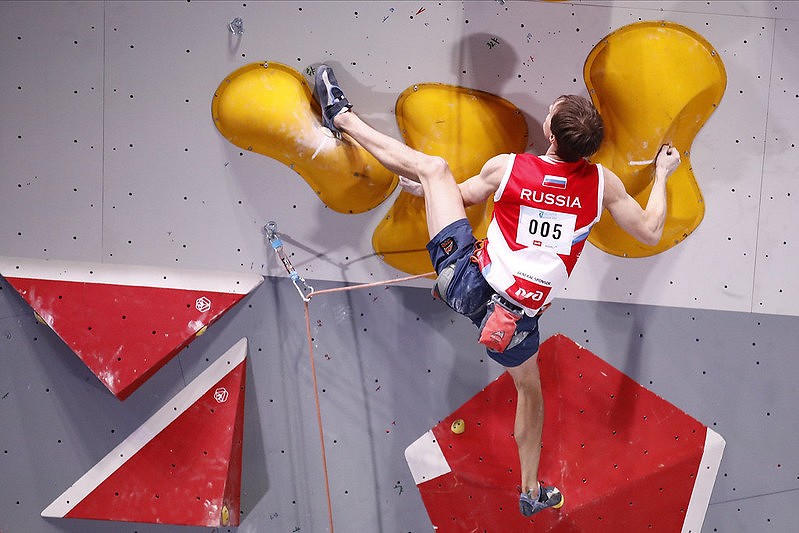
The Lead round made for tense viewing: Staša, Chloe and Viktoriia were the main contenders for the win after Patrycja fell low down on the route. Viktoriia surpassed Chloe's highpoint and easily topped out in just 4 minutes flat. The pressure was on for Staša, whose ranking was now dependent on how Molly and Eliska Adamovska would perform. If Molly or Eliska could top the route and beat Viktoriia's time, she would place second and her score would double on multiplication and Staša would be the overall winner. Molly fell going for the last move, which meant it was down to Eliska to decide Staša's fate. Moments later - after a composed climb and top by Eliska - the athletes are pictured trying to read the room and gain confirmation from their coaches while waiting for the results. A roar erupted from the Russian contingent as they compared times - Eliska was 1:03 minutes slower than Viktoriia - and the scores were confirmed.
Viktoriia shook her head and teared-up in disbelief, while Staša held her head in her hands. In the space of a week, Viktoriia had gone from an unknown quantity to a triple European Champion with a ticket to Tokyo; all achieved on home turf and apparently just four weeks after falling ill with COVID-19. It was an unusual competition under exceptional circumstances, but there's no doubt that we'll be seeing more from Viktoriia Meshkova in the coming years. Staša Gejo - arguably a fan favourite for the win and on the cusp of a remarkable comeback story following her knee injury early last year - had to settle for 2nd place, but her fighting spirit throughout the competition didn't go unnoticed. Eliska Adamovska pipped Patrycja Chudziak to 4th place; both athletes totalled 64 points, but on head-to-head comparisons Eliska had outranked Patrycja in two out of three disciplines.
The men's final proved to be just as dramatic. Once again, the route was far too easy. Sergei Luzhetskii (RUS) topped in what seemed like a blistering time (2:51 minutes) and put the pressure on the climbers to follow. Sascha Lehmann (SUI) - crowned European Lead Champion just days before - followed suit and knocked 20 seconds off Sergei's time to top out in 2:31 minutes. The livestream showed a jubilant Sascha looking for confirmation from his excited coaches, who seemed confident that he was faster. Given his win in Lead and his speedy ascent, it seemed almost a given that Lead World Cup winner Sascha would take 1st place, and on the livestream it appeared as though some athletes were already congratulating him.
But there was still an opportunity for the lesser-known Yuval Shemla (ISR) - who had qualified in 1st place in the Lead round - to top out quicker and knock Sascha out of 1st place and into 2nd, hence doubling his score on multiplication. An incredible run from Yuval saw him sprinting up the wall to clock 2:20 minutes and win the round. In an unexpected twist, Sascha's score doubled from 12 to 24 points, while Alexey Rubtsov - on 5 points following his win in Boulder and earning a respectable 4th place in Lead - was now on 20 points. The camera lingered on Sascha and Alexey as they waited for the time to be confirmed and for the official results to flash up; a previously ecstatic Sascha was suddenly withdrawn as Alexey jumped for joy and welled up with emotion as the realisation that he would be heading to Tokyo sunk in. Last year, he injured his bicep and appeared to have missed his chance for Olympic qualification. At 32 years old, Alexey will be the second-oldest Sport Climbing competitor in Tokyo and his qualification seemed to be a shock result for him — especially as he fell off the stage during observation of the Lead route in the Combined final...'Almost died!' he joked today in an Instagram story.
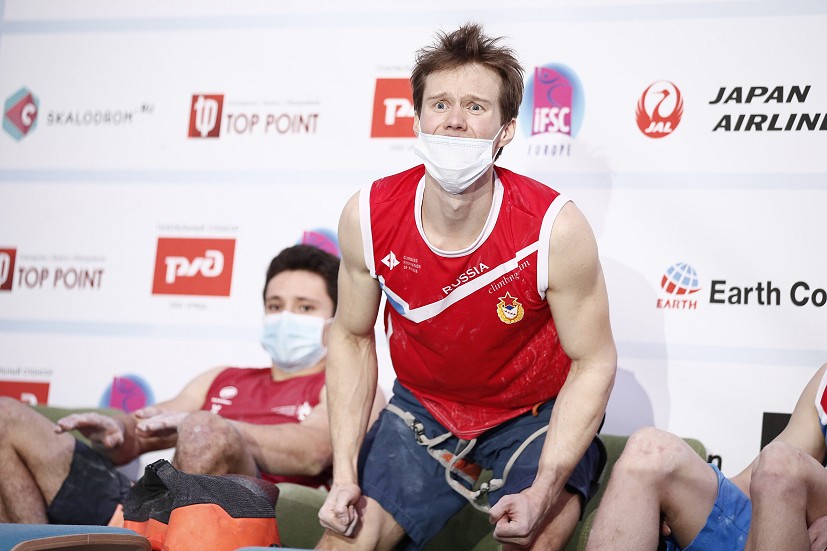
Russia did the double and now has three Olympic-qualified climbers after Iuliia Kaplina's qualification in Toulouse last November. As the livestream wrapped up before the awards ceremonies, athletes were shown oscillating between congratulating each other and wondering what might have been, had they climbed faster, reached one hold further or topped-out quicker. Given the year we've had it was always going to be an unpredictable event, but the winning athletes are certainly worthy of their Olympic spots and in the end, it was well worth the wait.
Molly Thompson-Smith and Will Bosi both finished in 8th place after a valiant fight throughout the week. Will told UKC:
'Overall, the fact that we were able to compete at all after this year was a great experience and I am really grateful I had the opportunity to compete for the final Olympic spot. The Combined Championship format was really physically demanding with the individual events happening in succession and just one rest day before the combined competition, so whilst it was great to compete in the individual rounds, my real objective began on day 6 of the competition!
'I am disappointed that I didn't grab the last Olympic spot, but there are lots of positives to take away from the experience for sure and making the combined finals was invaluable experience. For now, I am looking forward to resting up and getting away from the walls and back onto rock, but I will be back at World Cups next year for sure.'
Stay tuned for updated UKC Olympic Athlete Profiles on Alexey and Viktoriia. 6 Olympic spots remain to be filled by 3 men and 3 women.
The remaining three continental Olympic qualifying events are currently scheduled as follows:
IFSC Asia - Continental Championships (C) - Xiamen (CHN)
10 December - 13 December 2020
IFSC Oceania - Continental Championships (C) - Sydney (AUS) 2020
19 December - 20 December 2020
IFSC Africa - Continental Championships (C) - Cape Town (RSA) 2020
17 December - 20 December 2020
Watch the Combined Finals replay below:



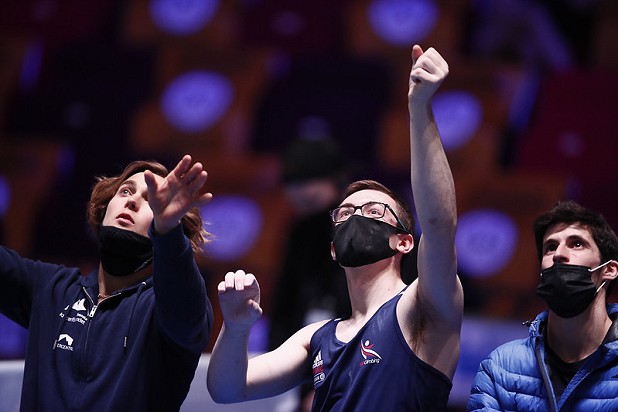
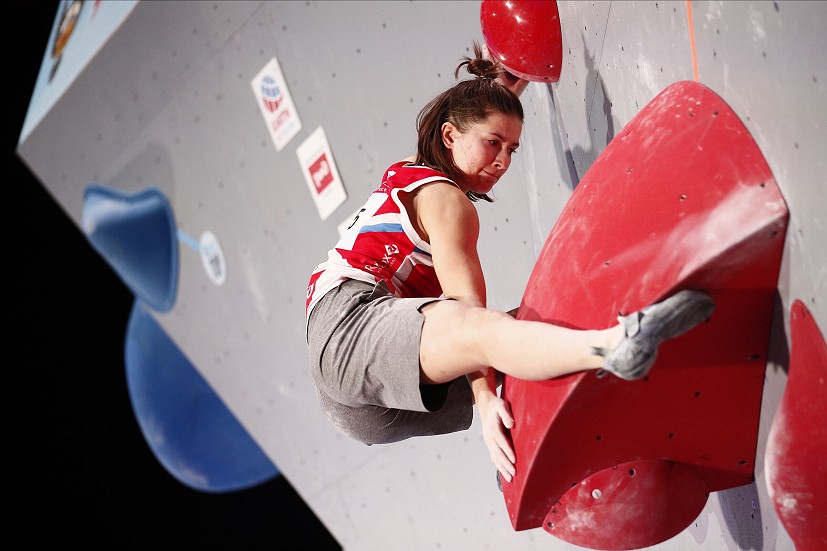
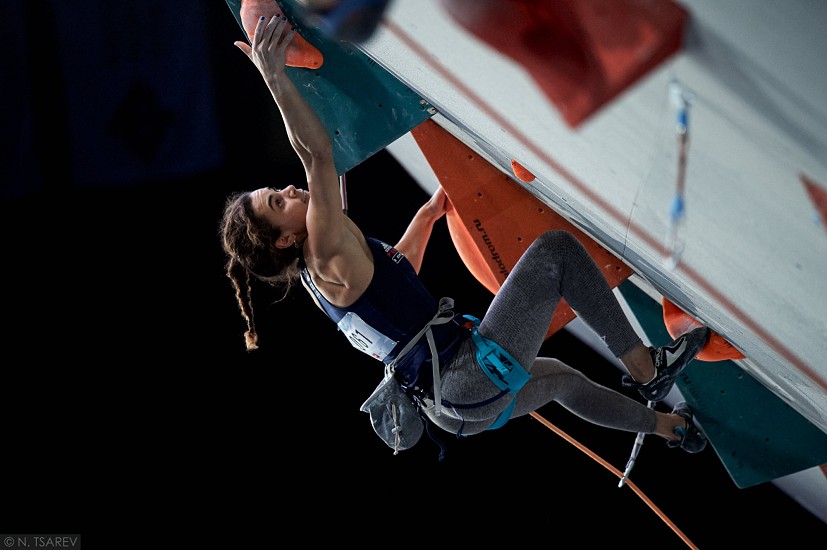






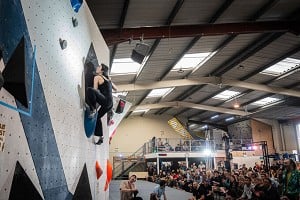
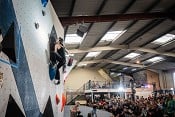

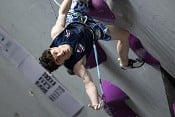
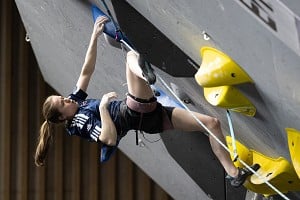
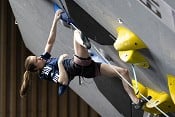
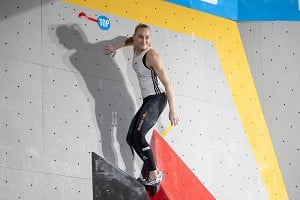
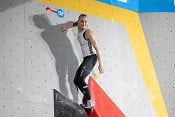


Comments
Great report Natalie.
I enjoyed watching the comps. I missed Charlie Boscoe, but Matt did a good job and surely he will continue to improve in the future. The event seemed well organised, but there were a couple of thigs that could have been done better.
The camera work was great, but the production team sometimes made weird choices (showing a replay while somebody was close to a top, lingering on someone on the mat instead of somebody climbing, etc). Understandable during such a long event, but sometimes frustrating. During the bouldering and lead (not combined) they failed to show the updated scores, making it hard to keep up sometimes. They did a better job during the combined event. Once again, the combined event was decided by the speed of completing a relatively easy lead route. I think after a long week of competitions it made sense for the setters to set an "easy" lead route and as you said it was difficult to second guess the athletes' fitness level in this crazy year. I hope though that this won't happen in the Olympics itself. The athletes will be on top form there and the boulders and lead route should be as hard as they would be during any World Cup events.Anyway, it was good to see some climbing again. How I have missed it!
Seconded
As happens from time to time at these comps a local team does the production. I presume that's what happened here. Most of the cutaways were to cover Russian climbers and I can understand why they did that. It did get a bit annoying. The stream was in HD at at 1080p and I really noticed the difference in quality. IFSC if you haven't updated your cameras please do so now.
Comp climbing just gets better and better.
Women's European Combined Championship results table, shows the lead results only?
Thanks Natalie for a great report!
I watched most of everything this week. There were loads of positive aspects in the coverage, and some very exciting competitions. I can't help thinking that the scoring system in the Combined event is in desperate need of revision generally, but especially for Tokyo. You need to present an Olympic sport in such a fashion that even a lay audience can grasp the system and understand what's going on, who has a chance and why, and what's needed to win. The tables shown were completely unintelligible with regard as to how the multipliers are decided upon. Matt Groom in this respect failed completely; he seemed just as much out of his depth as I was and didn't even attempt to explain why, if several climbers are shown on equal first place in one of the three Combined competitions, the multiplier is sometimes 2, sometimes 1.5, but never 1.
The classic example of how to make a sport broadcasting-compatible for a wide audience is the ski Biathlon, which is now one of the most exciting and popular winter sports. The IFSC should pay someone to sit down and do some serious thinking about how their big chance should be presented next year.
P. S. Are the Asian championships going to happen? No information about teams etc. on the website...
Sorry, just updated the women's results screenshot. My brain is a bit fried!!
Yeah, the tie-break situations can be complicated. I don't find the IFSC written rules that clear. Essentially it's the middle ground (median) of the number of ties, so 1.5 for a two-way tie, 2 for a 3-way tie, 2.5 for a 4-way tie, etc. At least, that's how I work it out in my head. I assume that's what a 'fractional ranking' is, as it's written in the rules. Paging Graeme...
I think the results both on screen and on the IFSC website could definitely be improved.